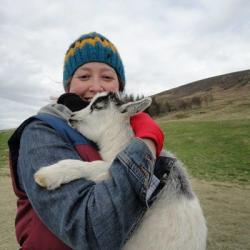An American politician once famously said “All politics is local,” and that’s as true in Iceland as anywhere else. Four years after Jón Gnarr was gleefully elected mayor after running on platform promises of a Disneyland at Vatnsmýri (where the domestic airport is currently located) and free towels at the pools, he’s stepping aside. “I think my time has come,” Jón Gnarr said, announcing his decision on a radio show this fall. “If I were to do it again, I would have to become a politician and I’m not one. I’m simply not a politician. I’m a comedian.”
There are, however, plenty of folks who would like to take his place. To help you get to know the candidates for Reykjavík’s 2014 municipal election (none of whom, we might add, are offering anything like a polar bear at the petting zoo), we reached out to the eight parties running and—because politicians love nothing better than a good long email from the press—asked them dozens of questions about their party policies, as well as city planning and social issues.
Happily, many of them have a lot to say about pressing issues facing the city. However, our questions and their answers were practically enough to fill the whole damn magazine so we’ve picked out some of them for you here; check out the PDFs below to read our guide in full.
Meet The Parties
![]() Alþýðufylkingin (xR)
Alþýðufylkingin (xR)
 (“The People’s Front Of Iceland”)
(“The People’s Front Of Iceland”)
Year founded: 2013
List leader: Þorvaldur Þorvaldsson
Website: althydufylkingin.blogspot.com
Agenda in one sentence: “Our programme aims at disconnecting city funds from capitalist interests and socialising its infrastructure, for public benefit, by cutting profit-driven outsourcing and partnerships, resurrecting public transport, starting city-run workplaces and the city’s own financial institution, and keeping profit-greedy capital from speculating in real estate and vacant land.”
Read full answers here.
![]() Björt Framtíð (xÆ)
Björt Framtíð (xÆ)
 (“Bright Future”)
(“Bright Future”)
Year founded: 2012
List leader: S. Björn Blöndal
Website: reykjavik.bjortframtid.is
Agenda in one sentence: “We want a well run, well organised, fun city that respects human rights.”
Read full answers here.
![]() Dögun (xT)
Dögun (xT)
 (“Dawn”)
(“Dawn”)
Year founded: 2008
List leader: Þorleifur Gunnlaugsson
Website: dogunreykjavik.is
Agenda in one sentence: “We are about justice for all people, especially those in need.”
Read full answers here.
![]() Framsókn (xB)
Framsókn (xB)
 (“The Progressive Party”)
(“The Progressive Party”)
Year founded: 1916
List leader: Sveinbjörg Birna Sveinbjörnsdóttir
Website: framsokn.is
Agenda in one sentence: “We value human dignity above financial values.”
Read full answers here.
![]() Píratar (xÞ)
Píratar (xÞ)
 (“The Pirate Party”)
(“The Pirate Party”)
Year founded: 2012
Captain: Halldór Auðar Svansson
Website: piratar.is/sveitarstjorn/reykjavik
Agenda in one sentence: “We value the protection and expansion of civil liberties, with a unique focus on direct democracy and transparency.”
Read full answers here.
![]() Sjálfstæðisflokkurinn (xD)
Sjálfstæðisflokkurinn (xD)
 (“The Independence Party”)
(“The Independence Party”)
Year founded: 1929
List leader: Halldór Halldórsson
Website: xdreykjavik.is
Agenda in one sentence: “We want to give the people in Reykjavík the opportunity to choose which services they need most and we will listen to the needs of our residents—especially regarding major changes that directly affect their life or communities.”
Read full answers here.
![]() Samfylkingin (xS)
Samfylkingin (xS)
 (“The Social Democratic Alliance”)
(“The Social Democratic Alliance”)
Year founded: 2000
List leader: Dagur B. Eggertsson
Website: xsreykjavik.is
Agenda in one sentence: “We want Reykjavík to develop as an interesting, liveable, sustainable and just city that emphasises opportunities for all its citizens.”
Read full answers here.
![]() Vinstrihreyfingin – grænt framboð (xV)
Vinstrihreyfingin – grænt framboð (xV)
 (“The Left-Green Movement”)
(“The Left-Green Movement”)
Year founded: 1999
List leader: Sóley Tómasdóttir
Website: vg.is/sveitarstjorn-2014/reykjavik/
Party agenda in one sentence: “Our vision of Reykjavík is not that different from our vision for Icelandic society as a whole—we believe in equality, economic and social justice and a truly multi-cultural society in which everyone can feel at home and blossom.”
Read full answers here.
—
What On Earth Are These People Talking About?
A crash course in a few of Reykjavík’s hot button issues…
The Dublin Regulation is a European Union law (which Iceland has also ratified) that is intended to establish which EU member country is responsible for reviewing an asylum application. This law allows a participating country to return an asylum applicant to the EU country that he or she first entered to process their case, but it does not obligate such deportations. Iceland’s Ministry of the Interior has often cited this law as justification for deporting asylum applicants rather than reviewing their applications. (Do note that the city’s influence on asylum seeker issues only extends to what kind of support it offers them when they are here.)
The Reykjavík domestic airport was built in the Vatnsmýri area by occupying British forces during WWII. For the past two decades, the city has been working to relocate it, despite a large number of people wanting to keep it where it is, particularly out-of-towners. Recently, it was agreed that the airport would stay in its current location until at least 2022, while a committee considers alternative locations around Reykjavík.
Reykjavík Energy is a municipally owned utility company that supplies Reykjavík and surrounding areas with heat, water and electricity. Despite the steady demand for its services, Reykjavík Energy managed to rack up a 233 billion ISK debt (2 billion USD), which is nearly four times the city’s annual budget. Turning this company around has been one of the biggest tasks that The Best Party / Social Democratic Alliance majority faced when it entered office in 2010.
In 2011, the current administration embarked on reforms, combining several schools despite loud protest from the city council minority and general public. This has freed up 30 million ISK per year, which opponents argue is not enough to warrant the measures, but Jón Gnarr claims it will have a profound effect in the future.
—
Who, What, Where, Why And How
By The Human Rights Office
Am I allowed to vote?
Foreign nationals are granted the right to vote depending on length of residence in Iceland:
• Nordic nationals can vote when they have had legal residence in Iceland for a period of three consecutive years from May 31, 2011.
• Other foreign nationals when they have had legal residence in Iceland for a period of five consecutive years from May 29, 2009.
Do I have to register?
No. Anyone who has the right to vote will automatically be on the electoral roll in the municipality where their legal residence (‘lögheimili’) is registered as of May 10, 2014. The electoral roll will be accessible for a period of at least 15 days prior to Election Day on the website www.kosning.is. The roll is also available at municipal government offices no later than ten days prior to the date of the election.
For more information (some of which has been translated into 13 languages), see this web page.
Why should I vote?
Local elections are the opportunity to have your say, locally, right in your own neighbourhood. Elections for city council and the mayor happen only every four years. Some people, especially immigrants, tend to not exercise their right to vote. Perhaps they do not think they understand enough about local politics to make a decision, they don’t think their vote counts, or local issues just do not seem that exciting or important. The reality is that the local elections are very important. Locally elected officials make huge decisions about our daily lives that are often undervalued.
My vote does not matter.
That is completely, patently false. In Icelandic local elections every vote counts and just a handful of votes or a tiny percentage can make a difference. In the 2010 municipal elections in Dalvík, the majority won by only one vote and in the same year in Stykkishólmur by three votes. Indeed, every vote can make a difference.
I don’t understand what is going on.
Granted the world of politics is confusing, even in our home countries where we can follow along in our own language. But there are ways to cut through all the confusion and to get to the heart of the matter. For instance:
Some parties have translated their manifestos and various policies into English and other languages, so have a look on their websites.
If you know Icelandic, you can read transcripts of council and committee meetings, which gives you a good idea of which way each party is leaning on various issues. For instance, if you are interested in education issues read some of the minutes from the Education Council (‘menntaráð’)
Talk to people you know who belong to the various parties. Ask them questions about things that interest you and what their party intends to focus on.
You can actually call their offices and talk to them. Ask them questions about what you think is important.
Attend meetings held by the parties. Do your best to understand and then during coffee breaks approach members and ask them questions.
Local issues aren’t really that important. All the important stuff happens in Alþingi!
While Alþingi sets laws and regulations regarding the bigger picture there is still a lot that gets decided upon on a local level. For instance, Alþingi passes a law that each municipality must offer basic social services, and what the minimum amount of financial support should be, but local officials decide the everyday details on how the service should be run, where service centres should be placed and their opening hours. Local officials also have the freedom to decide to pay higher than the minimum set by the State and exactly how funding should be used.
Local issues aren’t that exciting.
They can be very exciting as local officials decide what kind of city you live in. Where should new parks be? Where is it ok to open a new pub or hotel? What streets should be pedestrian only and should we build new bike paths? New high-rise buildings to replace older buildings? Locally elected officials actually decide what your city is going to look like, both in the near and distant future.
But I don’t use any city services, so why should I care?
Perhaps you are not on social welfare or don’t have any school-aged children. But do you ever go the swimming pools, or walk down the city sidewalks, take the bus, throw out your trash, appreciate streetlights, or just sit on a bench somewhere? Then you use city services and have the opportunity to have an effect on all of these things.
Here’s a list of local-run institutions and programmes:
- sports, recreation, cultural and library services
- fire and emergency services
- water, electricity and sewer services
- snow and garbage removal
- road, sidewalk and bike, path, maintenance and safety
- play-schools, primary schools, day parents, after-school centres
- swimming pools, parks, playgrounds
- social services, services for the elderly, infirmed and disabled
- city planning, building permits, business permits
- drug, alcohol and tobacco prevention
- human rights and equality
- buses and public transportation
Buy subscriptions, t-shirts and more from our shop right here!


















